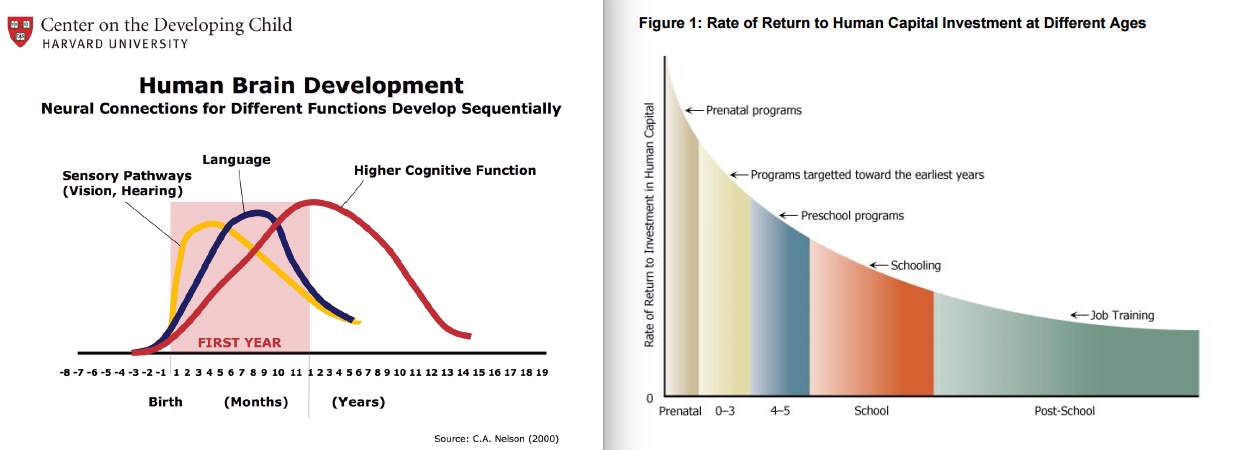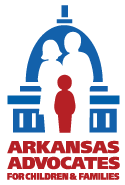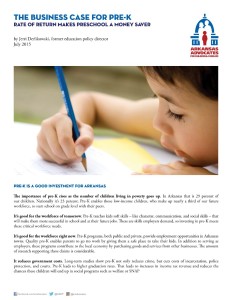Pre-K is a great investment for Arkansas’s future workforce and a critical resource for working families.
Justin Eaton, Owner, IDK? Café, Bentonville, AR
4 Things You Need to Know About Pre-K Right Now
The importance of pre-K rises as the number of children living in poverty goes up. In Arkansas that is 29 percent of our children. Nationally it’s 23 percent. Pre-K enables those low-income children, who make up nearly a third of our future workforce, to start school on grade level with their peers.
It’s good for the workforce of tomorrow. Pre-K teaches kids soft skills – like character, communication, and social skills – that will make them more successful in school and at their future jobs. These are skills employers demand, so investing in pre-K meets these critical workforce needs.
It’s good for the workforce right now. Pre-K programs, both public and private, provide employment opportunities in Arkansas towns. Quality pre-K enables parents to go to work by giving them a safe place to take their kids. In addition to serving as employers, these programs contribute to the local economy by purchasing goods and services from other businesses. The amount of research supporting these claims is considerable.
It reduces government costs. Long-term studies show pre-K not only reduces crime, but cuts costs of incarceration, police protection, and courts. Pre-K leads to higher graduation rates. That leads to increases in income tax revenue and reduces the chances these children will end up in social programs such as welfare or SNAP.
Rate of Return
Larry Schweinhart, an early childhood program researcher, talks about the return on investment pre-K brings.
Preschool saves K-12 public schools money. It reduces special education costs and grade retention. It also improves classroom productivity. Cost savings to the school district come close to covering the cost of providing pre-school without regard to other social costs avoided.1 Much of this research is further supported by recent developments related to toxic stress and its impact on child development for low-income children.2
Much of the rate-of-return analysis is based on cost avoidance. The Washington State Public Policy Institute completed a meta-analysis of hundreds of studies focusing on this aspect of the value of pre-K.3 Other cost savings result from better health and nutrition and lower crime rates. There are numerous long-term studies demonstrating the impact of preschool on children from low-income homes. These benefits last into adulthood.
The Perry Preschool Program,4 the Abecedarian Project,5 and the Chicago Child-Parent Centers6 were all part of in-depth, long-term studies that included cost-benefit analyses. They showed annual rates of return, adjusted for inflation, from seven percent to 20 percent. These studies are important because they are long-term, tracking students into adulthood.
In both the Perry Preschool study and the Abecedarian project study, reduced crime led to reduced costs for incarceration, police protection, and court costs. Pre-K leads to higher graduation rates. That leads to increases in income tax revenue and reduces the chances these children will end up in social programs such as welfare or SNAP.
Pre-K teaches kids soft skills – like character, communication, and social skills – that will make them more successful in school and at their future jobs.
Soft Skills for Employment
Pre-K reduces costs for future employers because students gain soft skills as part of their pre-K programs. These skills include developing character and learning social skills that employers need.7 In pre-K, kids learn how to resolve conflicts, how to negotiate, and how to talk things out. Researchers Duckworth8 and Tough 9 emphasize the traits that enable children to succeed even when they are surrounded by dysfunctional and chaotic home environments. These traits are persistence, self-control, and sometimes grit. This is something many charter schools focus on in their pre-K programs including KIPP Delta.
Brain Development
It makes economic sense that we should invest in children’s learning at the time when brain development is at its highest. The Harvard child study shows that brain connections related to higher cognitive function peak after a child’s first birthday but well before kindergarten.10
James Heckman is a Nobel Laureate in Economics and the Henry Schultz Distinguished Professor of Economics at the University of Chicago. He identifies the dwindling return on education and training investments as students move from infancy to post-secondary training. Unfortunately, we are spending the most money long after learning time peaks.

Employment
Pre-K programs are a piece of the Arkansas economy. Pre-schools hire people. They provide care so parents can work. We want parents from low-income families to work so that they rely less on social programs like welfare and SNAP. Pre-K centers contribute directly to the economy by purchasing supplies and services. The centers are consumers for other sectors of the Arkansas economy, purchasing food, electricity, electronics, books, toys, and other goods.
Refuting Arguments Against Pre-K
Some recent criticisms of the longitudinal impacts of pre-k have garnered a bit of press attention. Here are the facts:
- Early childhood education can have large and lasting impacts.
- Even when test score gains diminish over time (and this finding is in no way universal), earnings increase. Children who attended pre-k have higher earnings as adults, often by large and lasting percentages.11
- We should continue to invest in robust, high-quality early childhood education programs. The best bang for our buck is in ensuring that our state’s pre-k programs meet demand and exceed quality standards.12
Jack P. Shonkoff, M.D., director of the Center on the Developing Child at Harvard University talks about the basic concepts of early childhood development and its lasting impacts.
Pre-K in Arkansas

Pre-K enjoys widespread support here in Arkansas. Click the image to watch the first video in our #PREKSTORIES series. It features Victor Rojas, a substitute kindergarten teacher ifrom De Queen.
Research on the state pre-K program, Arkansas Better Chance, has been favorable and consistent with findings in long-term research. However, we do not have a sufficient history yet to assess the long-term adult outcomes that were available for other studies. Studies have been conducted by both the Arkansas Research Center13 and NIEER14. The ForwARd Arkansas, “State of Education in Arkansas 2015 Report Summary” notes that “Pre-K helps children, especially low-income, build skills for kindergarten and beyond.”15
The Office of Education Policy at the University of Arkansas called for more pre-K research and had this to say: “From our review of the research, we believe that students participating in Arkansas’s pre-K programs are entering kindergarten academically ahead of their peers and are less likely to be retained. These are very positive outcomes for young students, and we are looking forward to reviewing continued research examining how these effects can be carried on throughout the academic careers of these young students.”16
Scott Shirey of KIPP Delta has added pre-K to the educational program at the KIPP Delta schools. He would like to expand it but can’t because of space. “The research around quality pre-K is clear,” Shirey said. “Students who have a strong start to their education have an advantage over those who do not. Beyond improving academic gains, students coming from quality pre-K programs learn essential life and character skills such as curiosity and grit that stay with them well beyond their formative years. Thus, given the fact that the lessons learned in pre-K stay with our children for a lifetime, it would follow that a comparable level of attention and funding as K-12 would be appropriate.”17
If we want people to find successful employment, contribute to our economy, stay off public assistance and out of prison, we have to invest early. Arkansas kids need quality pre-K. They need to be reading at grade level by the end of third grade. And there’s no reason they shouldn’t graduate from high school ready for college or a career. If we want to build a strong workforce that everyone is a part of, we have to start with pre-K.
Notes
1 Richard Chase, Brandon Coffee-Borden, Paul Anton, Christopher Moore, and Jennifer Valorose. “The cost burdent to Minnesota K-12 when children are unprepared for kindergarten.” Wilder Research. December 2008.
2 Proceedings f the National Collaborative on Adversity and Resilience. Executive Summary. 2014
3 Washington State Public Policy Institute. “Meta-Analysis Benefits and Costs of Prevention and Early Intervention Programs for Youth. September 2004.
4 Lawrence J. Schweinhart, Jeanne Montie, Zongping Xiang, W. Steven Barnett, Clive R. Belfield, and Milagros Nores. “Lifetime Effects: The High/Scope Perry Preschool Study Through Age 40.” Ypsilanti, Mich.:High-Scope Press, 2005.
5 Leonard N. Masse and W. Steven Barnett. “A Benefit-Cost Analysis of the Abecedarian Early Childhood Intervention.” New Brunswick, NJ:National Institute for Early Education Research, 2002.
6 Arthur J. Reynolds, Judy A. Temple, Dylan L. Robertson, and Emily A. Mann. “Age 21 Cost-Benefit Analysis of the Title I Chicago Child-Parent Centers.” Educational Evaluation and Policy Analysis, 2002, Vol. 24, No. 4. 267-303.
7 Alex Blumberg. “Preschool: The Best Job-Training Program.” Planet Money, NPR. August 12,2011. https://www.npr.org/blogs/money/2011/ 08/12/139583385/ preschool-the-best-job-training-program
8 Angela L. Duckworth, Christopher Peterson, Michael D. Matthews, and Dennis R. Kelly. Grit: Perseverance and Passion for Long-Term Goals. Journal of Personality and Social Psychology, 2007, Vol. 92, No.6, 1087-1101.
9 Paul Tough. How Children Succeed: Grit, Curiosity, and the Hidden Power of Character. Mariner Books. 2012.
10 Center on the Developing Child, Harvard University. “InBrief: The science of early childhood development.”
11 Timothy J. Bartik. “The research consensus on early childhood education.” February 4, 2014.
12 W. Steven Barnett, “Actually, we do know if high-quality preschool benefits kids. What the research really says.” Washington Post. October 21, 2014.
13 Arkansas Research Center https://arc.arkansas.gov/ arc_web/resources/publications/ ABC_Shrinks_Gap.pdf
14 https://nieer.org/ sites/nieer/files/ Arkansas%20Longitudinal%20 Report%20May2013n.pdf
15 ForwARd Arkansas. “State of Education in Arkansas 2015 Report Summary”
https://static1.squarespace.com/ static/548f10fde4b0a269c59c6533/t/ 54c7bbcfe4b0cacf33fbf704/ 1422375887571/Forward+Report+Summary +1-26-15+FA.pdf
16 Email Correspondence. January 20, 2015.
17 Email Correspondence. April 27, 2015.


